Manmohan Singh (born 26 September 1932) is an Indian politician, economist, academician and bureaucrat who served as the 13th Prime Minister of India from 2004 to 2014. He is the third longest-serving prime minister after Jawaharlal Nehru and Indira Gandhi. A member of the Indian National Congress, Singh was the first Sikh and non-Hindu prime minister of India. He was also the first prime minister since Jawaharlal Nehru to be re-elected after completing a full five-year term.
Born in Gah, West Punjab, in what is today Pakistan, Singh’s family migrated to India during its partition in 1947. After obtaining his doctorate in economics from Oxford, Singh worked for the UN during 1966–1969. He subsequently began his bureaucratic career when Lalit Narayan Mishra hired him as an advisor in the Ministry of Commerce and Industry. During the 1970s and 1980s, Singh held several key posts in the Government of India, such as Chief Economic Advisor (1972–1976), governor of the Reserve Bank (1982–1985) and head of the Planning Commission (1985–1987).
In 1991, as India faced a severe economic crisis, the newly elected prime minister, P. V. Narasimha Rao, inducted the apolitical Singh into his cabinet as finance minister. Over the next few years, despite strong opposition, he carried out several structural reforms that liberalised India’s economy. Although these measures proved successful in averting the crisis, and enhanced Singh’s reputation globally as a leading reform-minded economist, the incumbent Congress Party fared poorly in the 1996 general election. Subsequently, Singh was leader of the opposition in the Rajya Sabha (the upper house of the Parliament of India) during the Atal Bihari Vajpayee government of 1998–2004.
In 2004, when the Congress-led United Progressive Alliance came to power, its chairperson Sonia Gandhi unexpectedly relinquished the prime ministership to Singh. His first ministry executed several key legislations and projects, including the National Rural Health Mission, Unique Identification Authority, Rural Employment Guarantee scheme and Right to Information Act. In 2008, opposition to a historic civil nuclear agreement with the United States nearly caused Singh’s government to fall after Left Front parties withdrew their support. India’s economy grew rapidly under his reign.
The 2009 general election saw the UPA return with an increased mandate, with Singh retaining the office of Prime Minister. Over the next few years, Singh’s second ministry government faced a number of corruption charges over the organisation of the 2010 Commonwealth Games, the 2G spectrum allocation case and the allocation of coal blocks. After his term ended in 2014 he opted out from the race for the office of the PM during the 2014 Indian general election. Singh was never a member of the Lok Sabha but has served as a member of the Rajya Sabha, representing the state of Assam from 1991 to 2019 and Rajasthan since 2019.
Early life and Education
Singh was born to Gurmukh Singh and Amrit Kaur on 26 September 1932, in Gah, Punjab, British India, into a Sikh family. He lost his mother when he was very young and was raised by his paternal grandmother, to whom he was very close. His early schooling was in the Urdu medium, and even as Prime Minister years later, he wrote his apparently Hindi speeches in the Urdu script, although sometimes he would also use Gurmukhi, a script used to write Punjabi, his mother tongue.
After the Partition of India, his family migrated to Amritsar, India, where he studied at Hindu College, Amritsar. He attended Panjab University, then in Hoshiarpur, Punjab, studying Economics and got his bachelor’s and master’s degrees in 1952 and 1954, respectively, standing first throughout his academic career. He completed his Economics Tripos at University of Cambridge in 1957. He was a member of St John’s College.
In a 2005 interview with the British journalist Mark Tully, Singh said about his Cambridge days:
I first became conscious of the creative role of politics in shaping human affairs, and I owe that mostly to my teachers Joan Robinson and Nicholas Kaldor. Joan Robinson was a brilliant teacher, but she also sought to awaken the inner conscience of her students in a manner that very few others were able to achieve. She questioned me a great deal and made me think the unthinkable. She propounded the left wing interpretation of Keynes, maintaining that the state has to play more of a role if you really want to combine development with social equity. Kaldor influenced me even more; I found him pragmatic, scintillating, stimulating. Joan Robinson was a great admirer of what was going on in China, but Kaldor used the Keynesian analysis to demonstrate that capitalism could be made to work.
Manmohan Singh
Read More: Mamata Banerjee | Xi Jinping
After Cambridge, Singh returned to India and served as a teacher at Panjab University. In 1960, he went to the University of Oxford for his DPhil, where he was a member of Nuffield College. His 1962 doctoral thesis under the supervision of I.M.D. Little was titled “India’s export performance, 1951–1960, export prospects and policy implications”, and was later the basis for his book “India’s Export Trends and Prospects for Self-Sustained Growth”.
Family and Personal Life
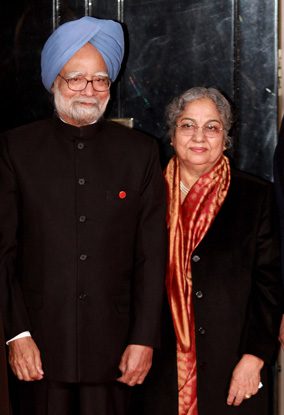
Singh married Gursharan Kaur in 1958. They have three daughters, Upinder Singh, Daman Singh and Amrit Singh. Upinder Singh is a professor of history at Ashoka University. She has written six books, including Ancient Delhi (1999) and A History of Ancient and Early Medieval India (2008). Daman Singh is a graduate of St. Stephen’s College, Delhi and Institute of Rural Management, Anand, Gujarat, and author of The Last Frontier: People and Forests in Mizoram and a novel Nine by Nine, Amrit Singh is a staff attorney at the American Civil Liberties Union. Ashok Pattnaik, 1983 batch Indian Police Service officer, son-in-law of former Prime Minister Manmohan Singh, was appointed CEO of National Intelligence Grid (NATGRID) in 2016.
Singh has undergone multiple cardiac bypass surgeries, the most recent of which took place in January 2009.
Manmohan Singh Height Weight Age Wife Children Family Biography
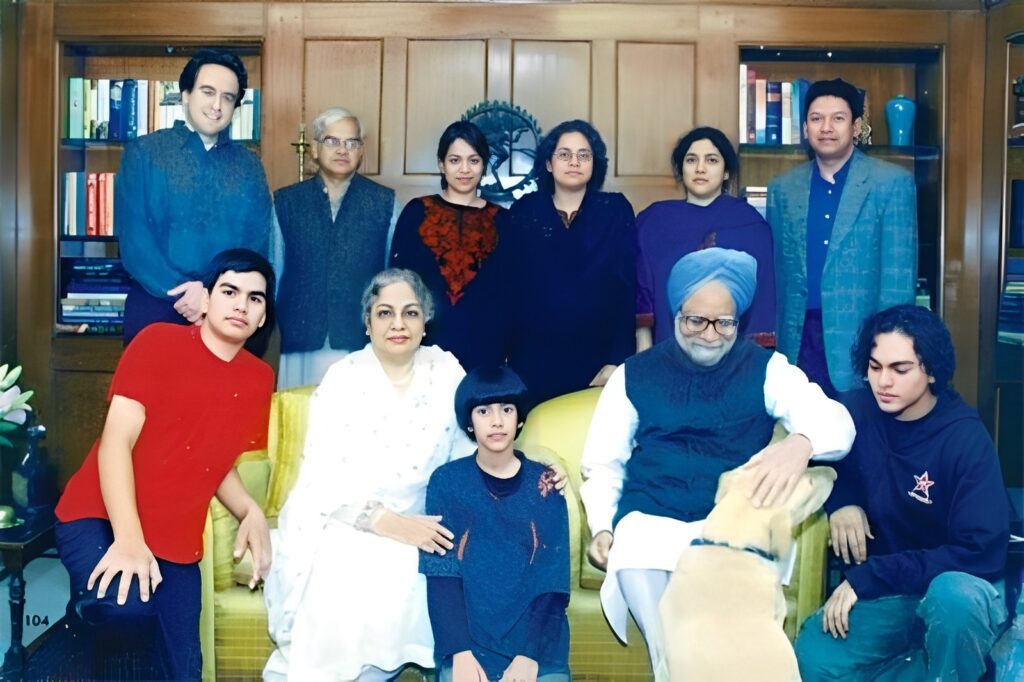
| Bio/Wiki | |
|---|---|
| Full Name | Manmohan Singh Kohli |
| Nickname | Mohan |
| Profession(s) | Economist, Bureaucrat, Politician |
| Physical Stats & More | |
| Height | in centimeters- 168 cm in meters- 1.68 m in feet inches- 5’ 6” |
| Weight (approx.) | in kilograms- 60 kg in pounds- 132 lbs |
| Eye Colour | Black |
| Hair Colour | Grey |
| Economics | |
| Doctoral Advisor | Ian Malcolm David (I.M.D.) Little |
| Thesis | “India’s export performance, 1951–1960, export prospects and policy implications” |
| Book | 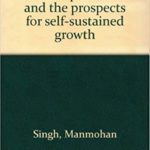 |
| Major Designation(s) | 1966–1969: Worked for the United Nations Conference on Trade and Development (UNCTAD) 1969: Appointed as an advisor to the Ministry of Foreign Trade by Lalit Narayan Mishra 1969-1971: Professor of International Trade at the Delhi School of Economics, University of Delhi 1972: Chief Economic Adviser in the Ministry of Finance 1976: Secretary in the Finance Ministry 1980–1982: Member of the Planning Commission 1982-1985: Governor of the Reserve Bank of India 1985-1987: Deputy Chairman of the Planning Commission (India) 1987-1990: Secretary General of the South Commission, an independent economic policy think tank headquartered in Geneva, Switzerland 1990: Advisor to Prime Minister of India on Economic Affairs during the tenure of V. P. Singh 1991: Chairman of the University Grants Commission |
| Awards, Honours, Achievements | 1952: Panjab University awarded him the University Medal for standing first in B.A. (Honors Economics) 1954: Panjab University awarded him the Uttar Chand Kapur Medal for standing first in M.A. (Economics) 1956: Adam Smith Prize by the University of Cambridge, UK 1983: Panjab University awarded him Doctor of Letters 1987: Padma Vibhushan by the Government of India 2009: Panjab University created a Dr. Manmohan Singh chair in their economics department 2002: Outstanding Parliamentarian Award by the Indian Parliamentary Group 2005: The University of Oxford awarded him an honorary Doctor of Civil Law degree 2005: Top 100 Influential People in the World by Time Magazine 2006: The University of Cambridge awarded him an honorary Doctor of Civil Law Degree |
| Politics | |
| Political Party | Indian National Congress (INC)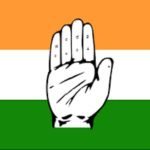 |
| Political Journey | 1991: Elected to the upper house of Parliament, the Rajya Sabha, from Assam for the first time and became the Finance Minister of India in the P. V. Narasimha Rao Government. 1995: Re-elected to the Rajya Sabha from Assam. 1998-2004: Leader of the Opposition in the Rajya Sabha. 1999: Contested for the Lok Sabha from South Delhi but lost to BJP’s Vijay Kumar Malhotra by over 30,000 votes. Rediff 2001: Elected to the Rajya Sabha from Assam for the third time. 2004: On 22 May, became the 13th Prime Minister of India to the 14th Lok Sabha. 2007: Elected to the Rajya Sabha from Assam for the fourth time. 2009: On 22 May, elected the Prime Minister of India to the 15th Lok Sabha. 2013: Elected to the Rajya Sabha from Assam for the fifth time. 2014: On 17 May, resigned from the post of the Prime Minister of India; after Congress’ loss in the 2014 Lok Sabha Elections. 2019: Elected to the Rajya Sabha from Rajasthan |
| Personal Life | |
| Date of Birth | 26 September 1932 |
| Age (as of 2023) | 91 Years |
| Birthplace | Gah, Chakwal, Punjab, British India (Now Punjab, Pakistan) |
| Zodiac sign | Libra |
| Signature | 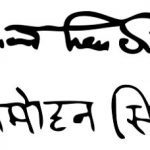 |
| Nationality | Indian |
| Hometown | Amritsar, Punjab, India |
| School | • A Village school in Gah, Peshawar (Name Not Known) Indian Express • Khalsa High School for Boys, Peshawar, British India (now, Government high school no.1 Chakwal) |
| College/ University | • Hindu College, Amritsar • Government College, Panjab University, Hoshiarpur (now, in Chandigarh) • University of Cambridge, Cambridge, England • Oxford University, Oxford, England |
| Educational Qualification(s) | • B.A. (Hons.) in Economics from Government College, Panjab University, Hoshiarpur (now, in Chandigarh) in 1952 • M.A. in Economics from Government College, Panjab University, Hoshiarpur (now, in Chandigarh) in 1954 • Economic Tripos from University of Cambridge in 1957 • Doctorate in Philosophy from the University of Oxford in 1960 |
| Religion | Sikhism |
| Caste | Khatri; Kohli (sub-caste; Kukrain) Hindustan Times |
| Food Habit | Non-vegetarian Note: He prefers vegetarian food |
| Address | 9, Safdarjung Lane, New Delhi |
| Hobbies | Poetry, Reading, Writing, Listening to Music |
| Controversies | • In 1993, a parliamentary investigation report criticised his ministry for not being able to anticipate a US$1.8 billion securities scandal. New York Times • During his a decade long tenure as the Prime Minister of India, the opposition often criticized him for being a “weak” Prime Minister. The Independent also criticized him under a headline- “Manmohan Singh – India’s saviour or Sonia’s poodle?” Times of India • His image was tarnished during his second tenure as the Prime Minister of India (from 2009 to 2014) as the UPA Government was accused of various corruption scandals. BBC • Mr. Singh also attracted controversies for his alleged inaction and indecisiveness in the 2G Spectrum Case and the Indian Coal Allocation Scam. |
| Relationships & More | |
| Marital Status | Married |
| Marriage Date | 14 September 1958 |
| Family | |
| Wife/Spouse | Gursharan Kaur (Homemaker) |
| Children | Son– None Daughter(s)– 3 • Amrit Singh (Human Rights Lawyer) • Daman Singh (Writer)br/> • Upinder Singh (Historian) |
| Parents | Father– Gurmukh Singh (a Clerk) Mother– Amrit Kaur Step-mother– Sitawanti Kaur |
| Grandparents | Grandfather– Sant Singh Grandmother– Jamna Devi |
| Siblings | Brother– 1 (Name Not Known; died at a very young age) Half-Brother(s)– 3 • Surinder Singh Kohli (Politician) • Daljit Singh Kohli (Politician; joined BJP in 2014) • Surjeet Singh Kohli (Politician) Sister– None Half-Sister(s)– 6 • Gobind Kaur • Pritam Kaur • Nirman Kaur • Narinder Kaur • Gyan Kaur • 1 More (Name Not Known) |
| Favourite Things | |
| Favourite Leader | Mahatma Gandhi |
| Favourite Poet | Iqbal |
| Favourite Colour | Grey |
| Favourite Food | Missi Roti, Vadiyaan, Pulao & Chhole |
| Style Quotient | |
| Car | Maruti 800 (1996 Model) |
| Money Factor | |
| Salary (as a Member of the Rajya Sabha) | ₹50,000/month + Other Allowances |
| Assets/Properties | • Two flats worth ₹7.27 crore- one in Chandigarh and another in New Delhi • 150.8 gm Gold Jewellery worth ₹3.45 lakh |
| Net Worth (approx.) | ₹11.6 crore (as in 2013) |
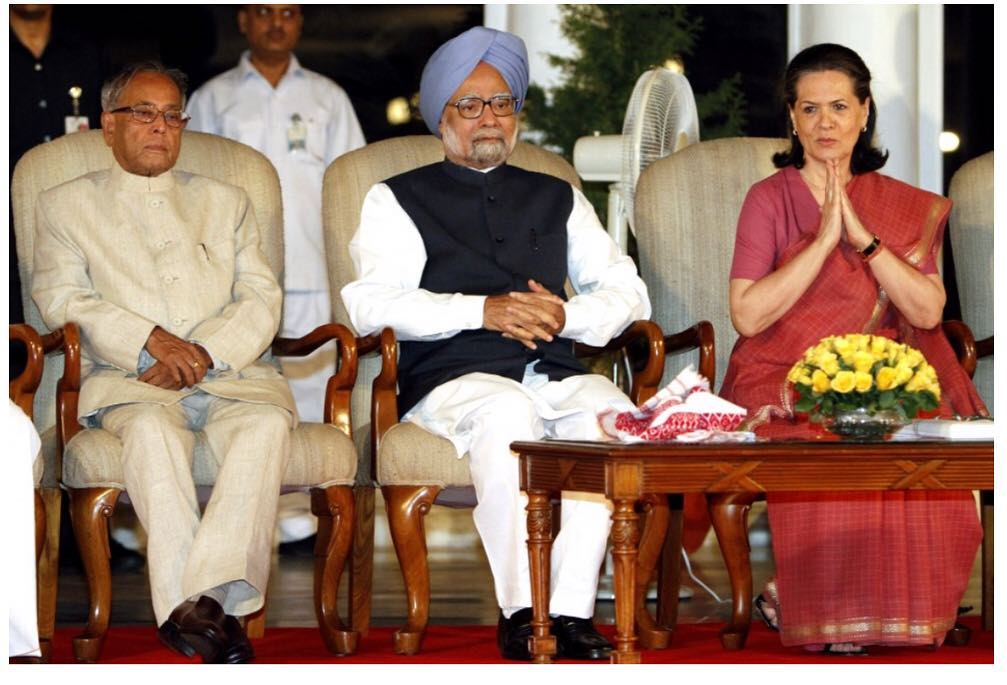
Early career
After completing his D.Phil., Singh returned to India. He was a senior lecturer of economics at Panjab University from 1957 to 1959. During 1959 and 1963, he served as a reader in economics at Panjab University, and from 1963 to 1965, he was an economics professor there. Then he went to work for the United Nations Conference on Trade and Development (UNCTAD) from 1966 to 1969. Later, he was appointed as an advisor to the Ministry of Foreign Trade by Lalit Narayan Mishra, in recognition of Singh’s talent as an economist.
From 1969 to 1971, Singh was a professor of international trade at the Delhi School of Economics, University of Delhi.
In 1972, Singh was chief economic adviser in the Ministry of Finance, and in 1976 he was secretary in the Finance Ministry. In 1980–1982 he was at the Planning Commission, and in 1982, he was appointed governor of the Reserve Bank of India under then finance minister Pranab Mukherjee and held the post until 1985. He went on to become the deputy chairman of the Planning Commission (India) from 1985 to 1987. Following his tenure at the Planning Commission, he was secretary general of the South Commission, an independent economic policy think tank headquartered in Geneva, Switzerland from 1987 to November 1990.
Singh returned to India from Geneva in November 1990 and held the post as the advisor to Prime Minister of India on economic affairs during the tenure of Chandra Shekar. In March 1991, he became chairman of the University Grants Commission.
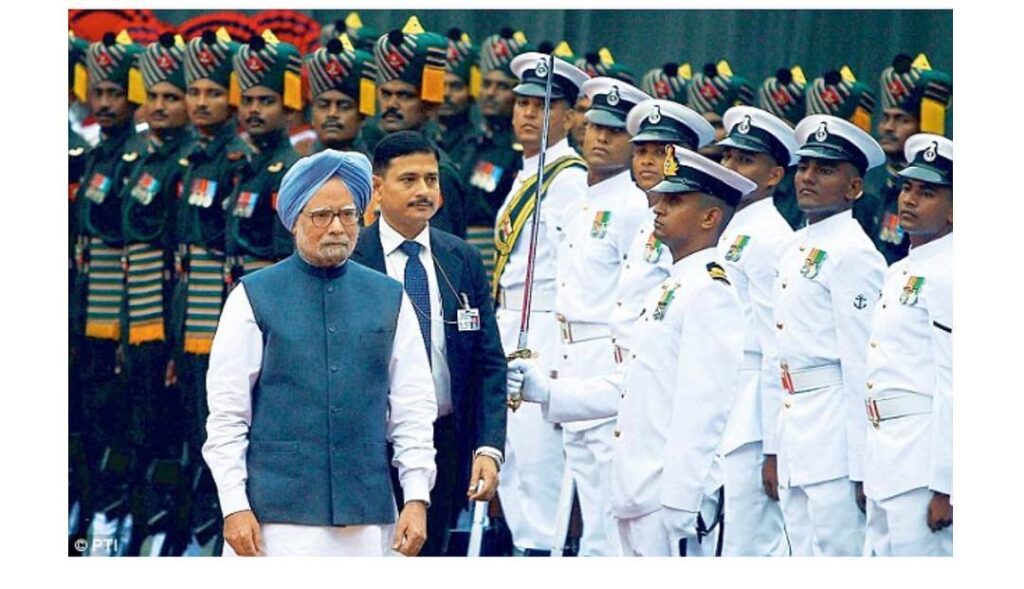
Political career
In June 1991, India’s prime minister at the time, P. V. Narasimha Rao, chose Singh to be his finance minister. Singh told Mark Tully the British journalist in 2005 “On the day (Rao) was formulating his cabinet, he sent his Principal Secretary to me saying, ‘The PM would like you to become the Minister of Finance’. I didn’t take it seriously. He eventually tracked me down the next morning, rather angry, and demanded that I get dressed up and come to Rashtrapati Bhavan for the swearing in. So that’s how I started in politics”.
Minister of Finance
In 1991, India’s fiscal deficit was close to 8.5 per cent of the gross domestic product, the balance of payments deficit was huge and the current account deficit was close to 3.5 percent of India’s GDP. India’s foreign reserves barely amounted to US$1 billion, enough to pay for 2 weeks of imports, in comparison to US$600 billion today.
Evidently, India was facing an economic crisis. At this point, the government of India sought funds from the supranational International Monetary Fund, which, while assisting India financially, imposed several conditions regarding India’s economic policy. In effect, IMF-dictated policy meant that the ubiquitous Licence Raj had to be dismantled, and India’s attempt at a state-controlled economy had to end.
Singh explained to the PM and the party that India is facing an unprecedented crisis. However the rank and file of the party resisted deregulation. So Chidambaram and Singh explained to the party that the economy would collapse if it was not deregulated. To the dismay of the party, Rao allowed Singh to deregulate the Indian economy.
Subsequently, Singh, who had thus far been one of the most influential architects of India’s socialist economy, eliminated the permit raj, reduced state control of the economy, and reduced import taxes
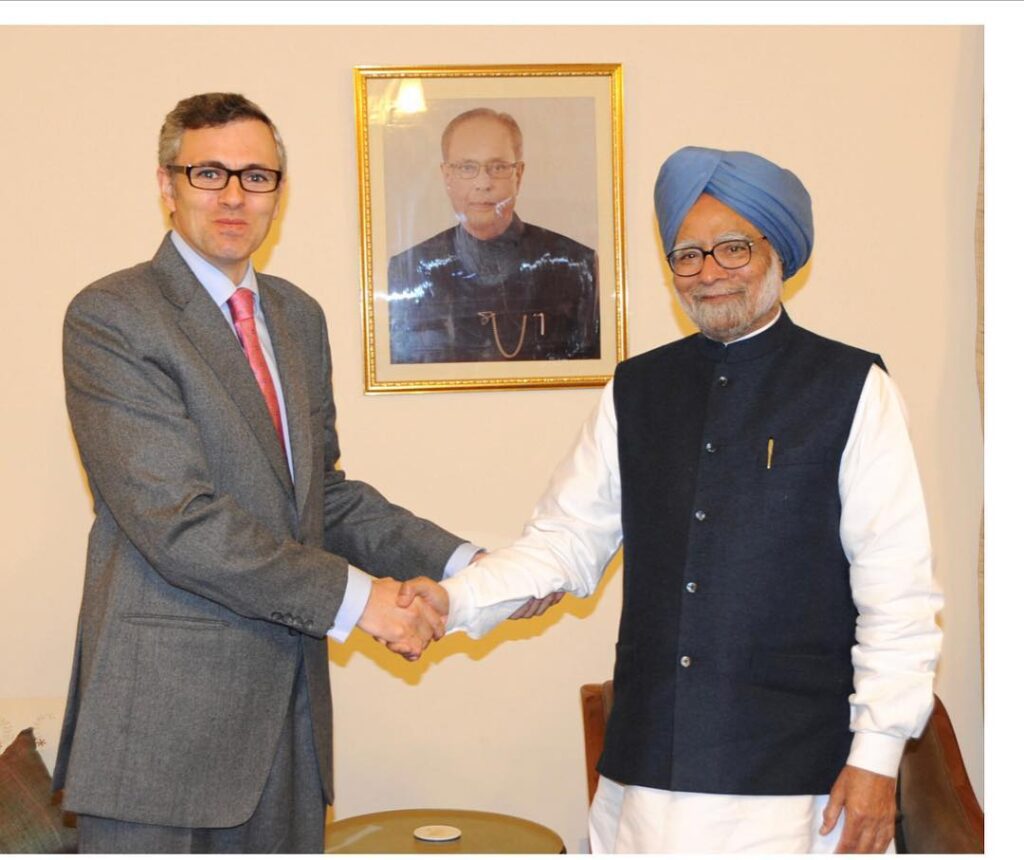
Rao and Singh thus implemented policies to open up the economy and change India’s socialist economy to a more capitalistic one, in the process dismantling the Licence Raj, a system that inhibited the prosperity of private businesses. They removed many obstacles standing in the way of Foreign Direct Investment (FDI), and initiated the process of the privatisation of public sector companies. However, in spite of these reforms, Rao’s government was voted out in 1996 due to non-performance of government in other areas. In praise of Singh’s work that pushed India towards a market economy, long-time Cabinet minister P. Chidambaram has compared Singh’s role in India’s reforms to Deng Xiaoping’s in China.
In 1993, Singh offered his resignation from the post of Finance Minister after a parliamentary investigation report criticised his ministry for not being able to anticipate a US$1.8 billion securities scandal. Prime Minister Rao refused Singh’s resignation, instead promising to punish the individuals directly accused in the report.
Leader of Opposition in Rajya Sabha
Singh was first elected to the upper house of Parliament, the Rajya Sabha, in 1991 by the legislature of the state of Assam, and was re-elected in 1995, 2001, 2007 and 2013. From 1998 to 2004, while the Bharatiya Janata Party was in power, Singh was the Leader of the Opposition in the Rajya Sabha. In 1999, he contested for the Lok Sabha from South Delhi but was unable to win the seat.
Post-premiership (2014–present)
Singh’s premiership officially ended at noon on 17 May 2014. He did not contest the 2014 general election for the 16th Lok Sabha as the prime ministeral candidate. Singh resigned his post as prime minister, after the Bharatiya Janata Party led National Democratic Alliance won the 2014 Lok Sabha election. He served as the acting prime minister till 25 May 2014, when Narendra Modi was sworn in as the new prime minister. Singh along with Congress president Sonia Gandhi, former Presidents A. P. J. Abdul Kalam and Pratibha Patil, Vice President Hamid Ansari attended Narendra Modi’s swearing-in ceremony. After the swearing-in ceremony Singh shifted to 3 Motilal Nehru Road, New Delhi. In 2016 it was announced that Singh was to take up a position at Panjab University as the Jawaharlal Nehru Chair, which he eventually never did.
Public image
The Independent described Singh as “one of the world’s most revered leaders” and “a man of uncommon decency and grace”, noting that he drives a Maruti 800, one of the humblest cars in the Indian market. Khushwant Singh lauded Singh as the best prime minister India has had, even rating him higher than Jawaharlal Nehru. He mentions an incident in his book Absolute Khushwant: The Low-Down on Life, Death and Most things In-between where after losing the 1999 Lok Sabha elections, Singh immediately returned the ₹2 lakh (US$2,500) he had borrowed from the writer for hiring taxis. Terming him as the best example of integrity, Khushwant Singh stated, “When people talk of integrity, I say the best example is the man who occupies the country’s highest office.”
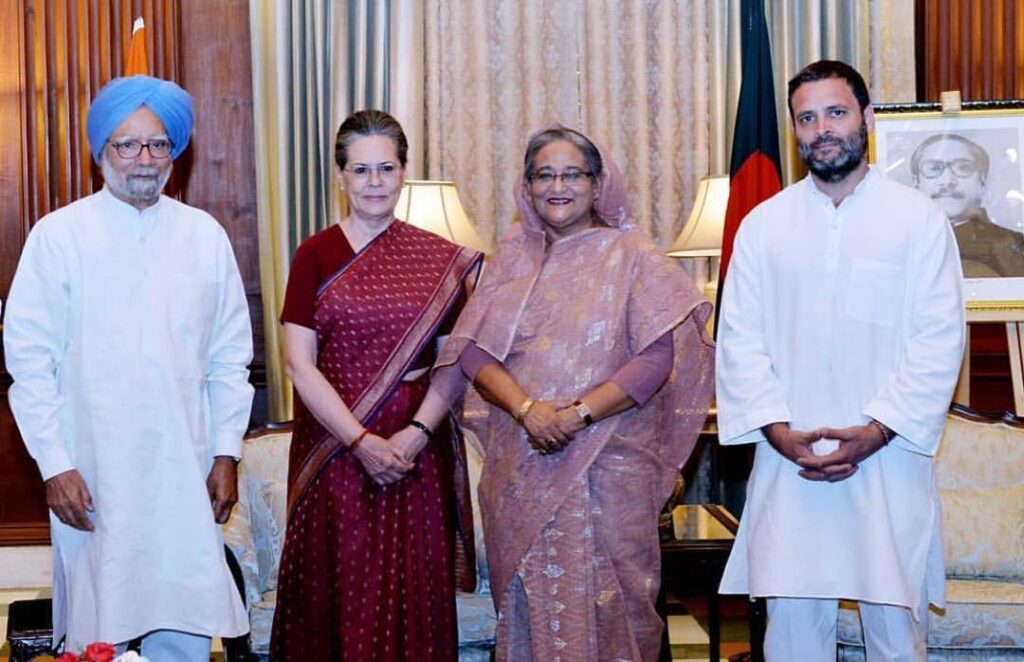
In 2010, Newsweek magazine recognised him as a world leader who is respected by other heads of state, describing him as “the leader other leaders love.” The article quoted Mohamed ElBaradei, who remarked that Singh is “the model of what a political leader should be.” Singh also received the World Statesman Award in 2010. Henry Kissinger described Singh as “a statesman with vision, persistence and integrity”, and praised him for his “leadership, which has been instrumental in the economic transformation underway in India.”
Manmohan Singh was ranked 18 on the 2010 Forbes list of the World’s Most Powerful People. Forbes magazine described Singh as being “universally praised as India’s best prime minister since Nehru”. Australian journalist Greg Sheridan praised Singh “as one of the greatest statesmen in Asian history.” Singh was later ranked 19 and 28 in 2012 and 2013 in the Forbes list.
Conversely, Time magazine’s Asia edition for 10–17 July 2012, on its cover remarked that Singh was an “underachiever”. It stated that Singh appears “unwilling to stick his neck out” on reforms that will put the country back onto a growth path. Congress spokesperson Manish Tewari rebutted the charges. UPA ally Lalu Prasad Yadav took issue with the magazine’s statements. Praising the government, Prasad said UPA projects doing well and asked, “What will America say as their own economy is shattered?”.
Political opponents, including BJP co-founder L. K. Advani, have claimed that Singh is a “weak” prime minister. Advani declared “He is weak. What do I call a person who can’t take his decisions until 10 Janpath gives instruction.” In 2013, BJP leader Narendra Modi had termed Singh as “night watchman” and a “puppet of the Gandhi family”.
In the recent years, political opponents have praised Singh. Arvind Kejriwal in 2018 said the people are “missing an educated PM like Dr Manmohan Singh”. In 2022, Nitin Gadkari said the “country is indebted to Manmohan Singh for the liberalisation that gave a new direction”.
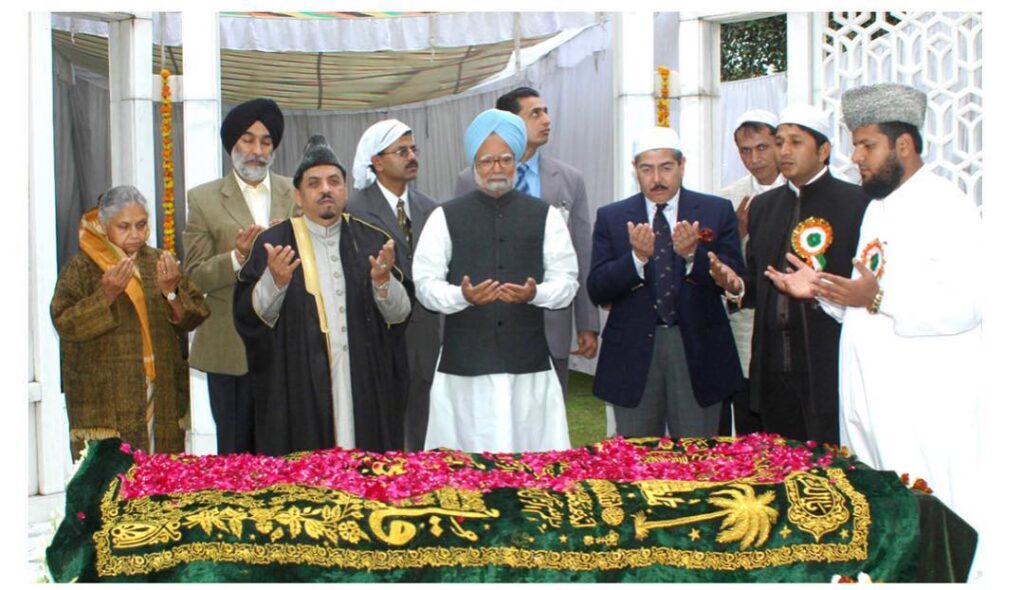
Degrees and posts held
- B.A (Honours) in Economics 1952; M.A (First Class) in Economics, 1954 Panjab University, Chandigarh (then in Hoshiarpur, Punjab), India
- Honours degree in Economics, University of Cambridge – St John’s College (1957)
- Senior Lecturer, Economics (1957–1959)
- Reader (1959–1963)
- Professor (1963–1965)
- Professor of International Trade (1969–1971)
- DPhil in Economics, University of Oxford – Nuffield College (1962)
- Delhi School of Economics, University of Delhi
- Honorary Professor (1966)
- Chief, Financing for Trade Section, UNCTAD, United Nations Secretariat, New York
- 1966 : Economic Affairs Officer 1966
- Economic Adviser, Ministry of Foreign Trade, India (1971–1972)
- Chief Economic Adviser, Ministry of Finance, India, (1972–1976)
- Honorary Professor, Jawaharlal Nehru University, New Delhi (1976)
- Director, Reserve Bank of India (1976–1980)
- Director, Industrial Development Bank of India (1976–1980)
- Board of Governors, Asian Development Bank, Manila
- Secretary, Ministry of Finance (Department of Economic Affairs), Government of India, (1977–1980)
- Governor, Reserve Bank of India (1982–1985)
- Deputy chairman, Planning Commission of India, (1985–1987)
- Secretary General, South Commission, Geneva (1987–1990)
- Advisor to Prime Minister of India on Economic Affairs (1990–1991)
- Chairman, University Grants Commission (15 March 1991 – 20 June 1991)
- Finance Minister of India, (21 June 1991 – 15 May 1996)
- Member of Parliament in the Rajya Sabha (1 October 1991 – 14 June 2019)
- Leader of the Opposition (India) in the Rajya Sabha (1998–2004)
- Prime Minister of India (22 May 2004 – 26 May 2014)
- Member of Parliament in the Rajya Sabha (19 August 2019 – Present)
In popular culture
A Bollywood film was made in 2019 based on Singh’s life, titled The Accidental Prime Minister directed by Vijay Gutte and written by Mayank Tewari. The film was based on the 2014 memoir of the same name by Sanjaya Baru with Anupam Kher in the titular role.
Pradhanmantri (lit. ’Prime Minister’), a 2013 Indian documentary television series which aired on ABP News and covers the various policies and political tenures of Indian PMs, includes the tenureship of Manmohan Singh in the episodes “Story of Sonia Gandhi and UPA-I Government”, and “Scams in UPA government and anti-corruption movement”.
